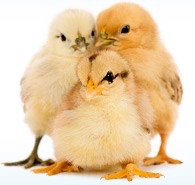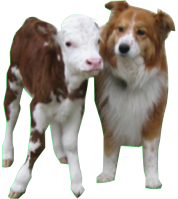FOLLOW




CATTLE



CHOOSE VEGAN is funded entirely by public donations. Animals depend on your generosity to continue vital work to expose and end animal abuse. Thank you for helping to free animals from cruelty.
BEEF
Beef cattle
There are around 1.6 million adult beef cows in the UK. As well as suckling their own calves, around 70% of youngsters born to dairy animals are also raised within beef herds. From the beef farmer's point of view, the heavier and "beefier" his calves the better. Specialist companies dealing in bull semen for artificial insemination (AI) provide the means to achieve this.
The most popular breed chosen to provide semen is the Belgian Blue. This animal carries a recessive gene for "double muscling", so-called because of the enormous muscles, particularly on the hindquarters. Belgian Blue stud bulls have to be born via Caesarean section because their sheer size makes natural delivery impossible.

What happens to the calves?
Male calves reared for beef are often castrated, despite being slaughtered before they reach sexual maturity. Methods commonly used include surgical castration, tight rubber rings that restrict blood flow, and appliances that crush the spermatic cord of each testis - the so-called "bloodless castrator".
Both dairy cows and beef cattle are de-horned - a painful procedure - to prevent animals injuring each other. Horns contain both blood circulation and nerve endings, and so local anaesthesia and cauterisation are necessary to stem bleeding. If horns have already developed, they are removed with saws, horn shears or cutting wire.
Young animals whose horns are not established can be disbudded. A hot iron is applied to the horn-forming tissue when the calf is 4-6 weeks old, permanently preventing growth.
Disease
The BSE crisis was followed in the winter of 1996/97 by a serious outbreak of food poisoning created by meat infected with E. coli 0157 bacteria. Twenty people died in a series of outbreaks in Scotland.
More than 700 types of E.coli have been identified. They are mainly harmless and inhabit the intestinal tract of people and other warm-blooded animals but a few strains, including the notorious O157:H7, can be deadly.
O157:H7 is found in the guts of many animals, but mainly cows. The increased number of human cases has been attributed to the intensification of farming practices and the consequent widespread use of antibiotics. Studies in France, Sweden and Canada have identified a positive correlation between the cattle density of an area and rates of human infection.
Consuming contaminated beef products is the most common source of infection, but the disease can be spread by any food or drink that has been tainted by animal manure.
Slaughterhouses are an obvious place for contamination of meat. Operators are urged to ensure the animals’ skins are not covered in faeces, and prevent the spillage of the digestive tract contents during and after organ removal. However, in 2008, secret filming by BBC journalists found carcasses at a number of Welsh abattoirs which had been health-marked by inspectors yet were contaminated by faeces.
WE BELIEVE IN A WORLD WITHOUT SLAUGHTER HOUSES




WHY LOVE ONE BUT EAT THE OTHER






ABOUT US
MEDIA
CONNECT
SUPPORT
Choose Vegan
the voice for animals
CONTACT






Which step have you reached today?
Slaughter
They will usually be allowed to live for 1-2 years, of a natural lifespan of 25. Cattle are usually slaughtered by first being stunned with a captive bolt, then being hung up by a back leg and bled to death (sometimes cattle are both stunned and killed electrically). Stunning is not always adequate. The animals may face distress and injury from the inadequate or inappropriate restraints and pens. There is potentially very significant pain and distress from the slaughter methods.

Go Meat and Dairy-Free
Killing an animal for food can never be regarded as humane. Animals lives are as important to them as ours are to us and none go to the knife willingly. Choosing organic or free-range over factory farmed meat, milk or eggs, continues to cause pain and suffering. The only viable solution to end animal suffering is to adopt foods that we were originally designed to eat, foods that are grown from the earth






